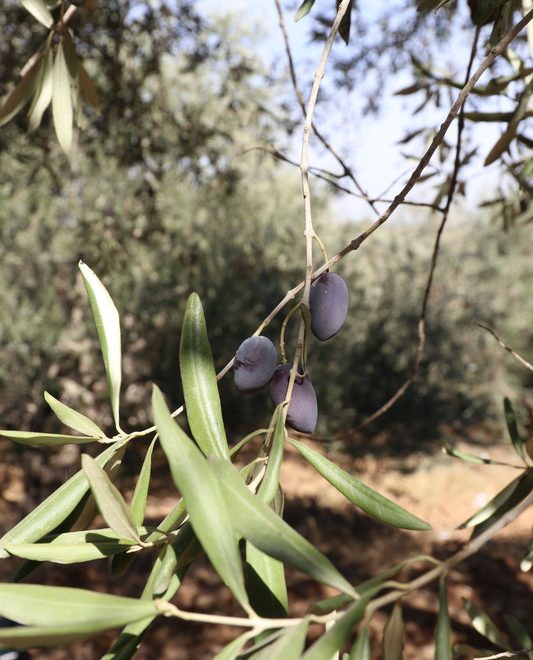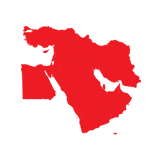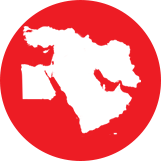With the eyes of the world focused on the horrifying humanitarian situation in Gaza, human rights abuses against the almost three million Palestinians living in the Occupied West Bank are on the rise. Since October 7, attacks on Palestinians by Israeli forces and settlers have spiked, killing at least 154 – 43 of them children – and leaving 2,100 people injured, according to the health ministry. More than 2,150 people have been arrested during frequent raids, according to the Palestinian Prisoner’s Society.
Amid the traditional olive harvest season – a time of great national significance for Palestinians – farmers have been forcibly prevented from reaching their olive trees or left too terrified of the risk of violence to travel to them, resulting in enormous economic loss.
Samar*, an olive farmer from Nablus Governate who has been prevented from accessing his harvest, said:
‘‘[The land] contains 1,860 fruitful olive trees, [that are] 70 years old. The attacks on this piece of land have been occurring since 2000. Now, in 2023, access to [the land] is completely prohibited. Israelis claim that because of the security situation, even watching it from the village or getting close to the land puts us in danger. More than once, they shot [at] us.”
Palestinians in the West Bank have had their freedom of movement drastically curtailed. Checkpoints have been closed, including between major cities like Bethlehem and Ramallah, and a strict lockdown enforced. Confined to their own communities, people are unable to go about their daily lives and travel to their jobs, their schools, and health facilities.
Imad lives in Hebron, a city in the West Bank. He said:
“Since the events of October 7th, the Israeli military has imposed military law on this area. It’s subject to a curfew. People and residents are prohibited from moving and leaving their homes, life became very [difficult]. The checkpoints have increased. More than 15 checkpoints and a new military point have been added.”
The number of Palestinians forced from their homes has also increased. Since October 7, 15 communities in the West Bank have been totally or partially displaced, with around 828 people affected, according to UNOCHA. It comes in a year where over 12,855 settler housing units across the West Bank were built in the first six months of 2023 alone, according to the Israeli NGO Peace Now – the most of any year on record. While settler attacks on communities across the West Bank were already high – and steadily increasing – before the crisis began, the last month has seen attacks more than double from an average of three incidents per day to seven, UNOCHA says.
Riham Jafari, Coordinator of Advocacy and Communication for ActionAid Palestine, said:
“Settler attacks on communities across the West Bank were already rising before the current crisis in Gaza started. Now, with the world’s gaze fixed on Gaza’s worsening catastrophe, Palestinians are being uprooted and displaced from their ancestral lands at gunpoint by Israeli soldiers and settlers as new settlements are built in complete violation of international law.”
The increase in checkpoints and attacks on communities across the West Bank is having an emotional and economic effect on Palestinians.
Riham also said:
“The olive harvest season is usually a hugely special and joyful time for Palestinians, when families and friends come together to pick their olives and share food. But this year is very different. Farmers have been shot dead while harvesting their crops, while others have had their trees cut, uprooted, or set on fire. This is not just attack in economic terms – it is an attack on our very sense of national pride and identity as Palestinians.
Daily life is rapidly [declining] for Palestinians in the West Bank. We live under constant surveillance, with no freedom to move around. With checkpoints closed, myself and other colleagues can’t even go to our ActionAid office in Hebron to do our jobs. Socializing has become a thing of the past, with many people too afraid to risk leaving their homes.
Palestinians in the West Bank are being treated like criminals simply for trying to go about our lives. How much longer must we be humiliated, how many more freedoms must we lose?”
*Not their real name.
[ENDS]
For media requests, please email Christal.James@actionaid.org or call 704 665 9743.
The following spokesperson is available:
- Riham Jafari, Coordinator of Advocacy and Communication for ActionAid Palestine
About ActionAid
ActionAid is a global federation working with more than 15 million people living in more than 40 of the world’s poorest countries. We want to see a just, fair, and sustainable world in which everybody enjoys the right to a life of dignity and freedom from poverty and oppression. We work to achieve social justice and gender equality and to eradicate poverty.


